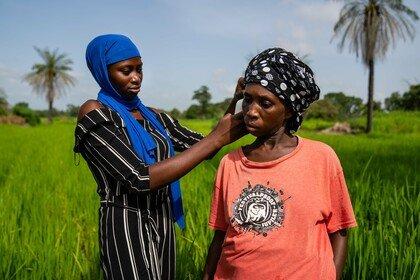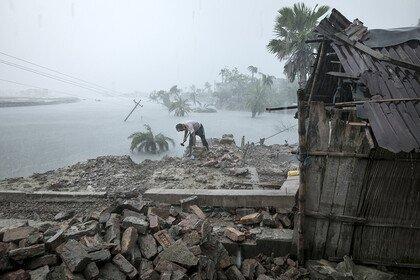
Wellcome awards £17.5m to support global research drive
As world braces for El Niño – can science help to limit the catastrophic health effects of soaring global temperatures?
- Wellcome supports 9 new research projects across 11 countries most affected
- With an El Niño event expected, effective and affordable interventions are vital to protect health
- To expedite action, studies will have collaborating partners from policy and/or practice-based institutions
Climate change - heat in particular – is threatening human health around the world. Affordable, effective, interventions that can protect health are critical, but global evidence is lacking on what works best.
To advance global solutions, Wellcome is today announcing £17.5m to support research teams testing adaptions to reduce and prevent heat-related illness and deaths.
Rising temperatures are directly related to heat-related deaths – and it is now estimated that 30% of all excess heat-related deaths are directly attributable to climate change. Our world is getting hotter and recent findings show a two-thirds chance that global average temperature will, at least temporarily, surpass the 1.5 degrees Centigrade warming limit within the next five years. The Earth Commission has reported that if the world does officially pass this target, it will cause further irreparable harm to planetary and human health.
Early forecasts also suggest an El Niño event is extremely likely to occur later in 2023, exacerbating extreme weather around the globe and in turn, increasing the risk of severe and deadly impacts to our health. For example, global heating that resulted in the hottest year in recorded history, 2016, was driven by a major El Niño event.
Countries across the world need a suite of context-specific options to enable them to limit the effects of extreme heat on health. Wellcome’s funding supports research to evaluate the effectiveness of interventions that are being implemented to adapt to extreme heat in some of the most affected parts of the world.
The funded projects include:
- The effects of cool roofs on health, environmental and economic outcomes. Lead Researchers: Sir Tukuitonga and Dr Bunker. Sites: Mexico, Burkina Faso, India, Niue
Sir Tukuitonga and Dr Bunker will investigate the effects of affordable, sunlight-reflecting cool-roof coatings – a home cooling intervention – on health, environmental and economic outcomes in four vulnerable populations.
- How can the health risks of extreme heat on pregnant women and newborns be reduced? Lead Researchers: Professor Chersich, Dr Maimela and Professor Luchters. Sites: South Africa, Zimbabwe
The research team will test whether an intervention encompassing behavioural, built environment and nature-based solutions can protect against the health impacts of heat exposure in pregnant women and their infants. These include, amongst others, using modifications to building design, such as white reflective roof and wall paint; low-cost water sprays; and awareness campaigns to shift physical workloads to other family members during late pregnancy.
- Health effects of heat in Southeast Asia: Behavioural and structural climate change adaptation interventions in semi-rural Malaysia. Lead Researcher: Professor Tin Tin Su
Professor Tin Tin Su will evaluate through individual, home-based, and community-based sensors, simple behavioural and structural interventions that have the potential to protect vulnerable communities from the health effects of extreme heat. Her team will introduce interventions to strengthen heat-health literacy and fluency that lead to better heat adaptation behaviours (such as using a fan, self-dousing, etc.) and test a passive cooling technology to decrease indoor exposure to extreme heat.
The evidence of the effects on health of climate change
Climate change is increasing the frequency and severity of extreme weather events that have the potential to have a direct impact on all our health. Extreme heat stress is a major cause of death and can also have significant wider impacts on health including foetal strain - affecting the development of babies in the womb - and adverse effects on mental health.
Changing environments fuelled by warming temperatures are also making new habitats more suitable and attractive for vectors that carry diseases, such as mosquitoes. By 2050, it is predicted that 500 million more people will be exposed to disease-carrying mosquitoes.
Too often there is a gap between research and action. To try to reduce these delays, the projects announced today, will have collaborating partners from policy and/or practice-based institutions to ensure that the communities who are already being affected will benefit as soon as possible from these discoveries.
Wellcome’s climate and health programme aims to ensure that researchers are producing evidence that can be directly used by policymakers and practitioners. This means identifying the most effective interventions that are relevant to the local context, can be scaled up, and have the potential to be implementable and sustainable.
Dr Modi Mwatsama, Head of Field Development for Climate & Health at Wellcome, said:
“We’ve seen dramatic effects of climate change in Europe and the USA in the last year or two – but none of this is new to people in lots of the world who have been feeling the effects of a heating world for longer.
“And it’s getting hotter, but there is currently very little evidence on the effect on health of climate change adaptation actions. This means that communities, cities and governments are designing and delivering climate change adaptations without understanding their wider implications, especially for public health.
“We want to change that. This funding will begin to fill some of these gaps and aim to provide practical, affordable, and effective solutions for the people that need them most urgently.”
The studies will run over 5 years. While these projects will be focused in specific areas and tailored to address local challenges, the findings should be transferable to other parts of the world.
Professor Matthew Chersich from Wits University and lead researcher for the maternal health and heat study, said:
‘’The health impacts of climate change pose grave threats for this generation and the next, starting from pregnancy. While the priority is to prevent further climate breakdown, it is also critical to find ways to limit the very real dangers of extreme heat on our health – especially for pregnant women and new-borns whom we know are especially affected.
“This funding will allow us to test different combination of interventions to find the best solution for doing so. Our hope is that eventually, these packages of solutions will be scaled up to protect vulnerable pregnant women across the world. Demonstrating how effective these interventions are is the first step towards that goal.”
Dr Aditi Bunker from University of Heidelberg/ University of Auckland and co-lead researcher on the effects of cool roofs study, said:
“The impacts of extreme heat are widespread with the most vulnerable communities often being hit hardest. An affordable, and scalable home cooling solution can potentially help to change that.
“We will investigate how applying a simple sunlight-reflecting cool-roof coating on people’s homes affects their health and energy use in four hot countries. Our trial shows the importance of testing interventions before they are implemented and scaled to reduce the burden of heat.”
Professor Tin Tin Su from Monash University Malaysia and lead researcher for the health effects of heat in Southeast Asia, said:
"To mitigate the negative impacts of heat and effectively address climate change and health issues, it is crucial for individuals and communities to make significant changes in their behaviour. By adopting suitable cooling solutions at an individual level, people can alleviate the physical strain caused by heat.
“This funding will enable us to implement and assess interventions aimed at adapting behaviour and infrastructure to combat heat-related challenges. Our goal is to understand the effectiveness and cost-effectiveness of various interventions, while also exploring the potential applicability of our approach in other low and middle-income countries."
Wellcome wants to support local communities and national governments alike, by providing them with much needed scientific data and findings to equip them to tackle combined climate and health emergencies.
Wellcome, a leading global funder of science to advance human health and wellbeing, has committed £16 billion over the coming decade to support scientific discovery and solutions to tackle the three most urgent health threats of our time - climate and health, infectious disease and mental health.

